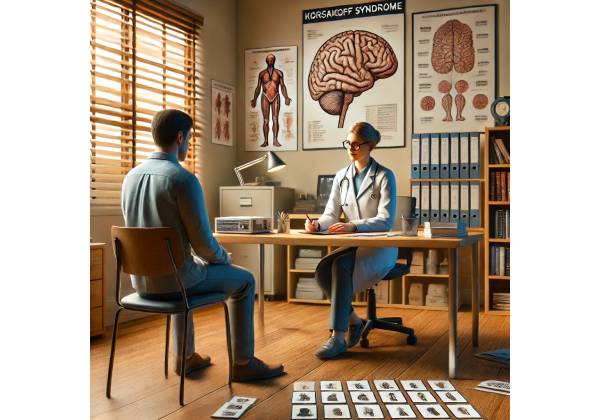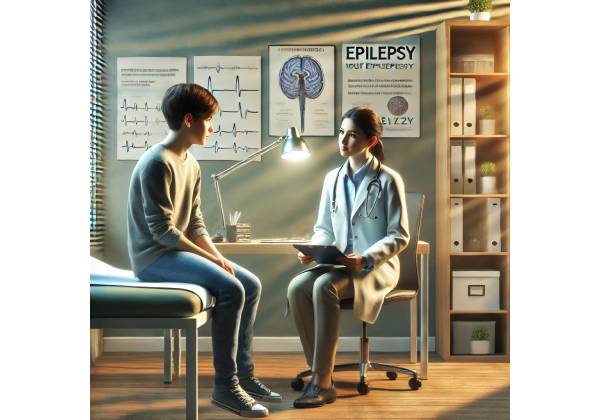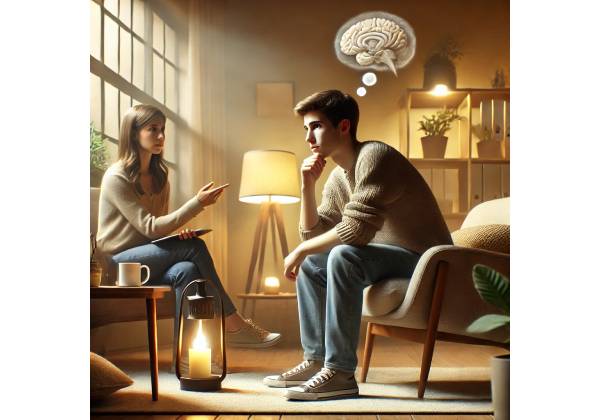Mild Cognitive Impairment Care: Newest Treatments and Therapies for 2025
What is mild cognitive impairment (MCI)? Mild cognitive impairment (MCI) is defined as cognitive decline that is more pronounced than typical age-related changes but not severe enough to significantly interfere with daily life or activities. Individuals with MCI have noticeable difficulties with memory, thinking, language, and decision-making but are largely independent. MCI is frequently regarded as a transitional stage between...
Exploring the Latest Advances in Menstrual Psychosis Treatment
What is Menstrual Psychosis? Menstrual psychosis is a rare psychiatric condition in which psychotic symptoms appear during a woman's menstrual cycle. Symptoms like hallucinations, delusions, disorganized thinking, mood swings, and behavioral changes are most common during the luteal phase (the time between ovulation and menstruation) or during menstruation. While the exact mechanisms underlying menstrual psychosis are unknown, it is thought...
Revolutionary Treatments for Melancholic Depression: From Ketamine to Psychedelics
What is Melancholic depression? Melancholic depression is a subtype of major depressive disorder (MDD) distinguished by distinct and severe symptoms, including a profound loss of pleasure (anhedonia) in almost all activities, a lack of emotional reactivity to positive stimuli, and an overwhelming sense of hopelessness or despair. People suffering from melancholic depression may wake up early in the morning with...
Innovative Treatments for Mania: From Ketamine to Neuromodulation
What is mania? Mania is a mental health condition characterized by an abnormally high mood, increased energy, and increased activity levels, which can impair an individual's ability to function. It is a core symptom of Bipolar Disorder, especially Bipolar I Disorder, in which people experience extreme mood swings ranging from depressive lows to manic highs. During a manic episode, people...
Malingering in the Modern Age: Innovative Treatment Strategies
Malingering is a condition in which a person knowingly fabricates, exaggerates, or feigns illness or injury for financial gain. Unlike factitious disorders or psychological conditions in which people unconsciously or compulsively exhibit symptoms, malingerers intentionally deceive others, usually for financial gain, to avoid work or military duty, to avoid legal consequences, or to obtain drugs. Malingering is distinguished from...
Cutting-Edge Therapies for Male Hypoactive Sexual Desire Disorder
What is Male Hypoactive Sex Desire Disorder? Male Hypoactive Sexual Desire Disorder (HSDD) is characterized by an ongoing lack of interest or desire for sexual activity. It extends beyond the temporary fluctuations in libido that many men experience as a result of stress, fatigue, or changes in life circumstances. HSDD has a negative impact on a man's sexual well-being, causing...
The Latest Advances in Treating Major Neurocognitive Disorder
What is major neurocognitive disorder? Major Neurocognitive Disorder (NCD), also known as dementia, is a condition marked by a significant decline in cognitive functioning that impairs daily activities and independent living. The term "Major Neurocognitive Disorder" was first used in the DSM-5 (Diagnostic and Statistical Manual of Mental Disorders, Fifth Edition) to describe a wide range of cognitive impairments, including...
New Innovations in Major Depressive Disorder Treatment.
What is Major Depression Disorder? Major Depressive Disorder (MDD), also known as depression, is a common and debilitating mental health condition defined by persistent feelings of sadness, hopelessness, and a loss of interest or pleasure in most activities. It influences how a person feels, thinks, and manages daily activities such as sleeping, eating, and working. MDD is more than just...
Cutting-Edge Treatments for Clinical Lycanthropy: A New Era of Care
What is lycanthropy? Lycanthropy, derived from the Greek words lykos (wolf) and anthropos (human), is a rare psychiatric syndrome in which a person believes they can transform into a wolf or other animal. This delusional disorder, also known as clinical lycanthropy, is a subtype of zoanthropy, a psychiatric condition in which a person believes they have or can transform into...
Effective Treatments for Logorrhea: From Medication to Neuromodulation
What is logorrhea? Logorrhea, also known as "pressured speech," is a condition marked by excessive and frequently incoherent talkativeness. The term is derived from Greek, with "logo" meaning "word" and "rrhea" meaning "flow." People with logorrhea typically have rapid, unrelenting speech that is difficult to interrupt and frequently lacks logical connections between topics. The condition is frequently associated with neurological...
New Therapies for Lithium Toxicity: From Hemodialysis to Pharmacogenomics
What is lithium toxicity? Lithium toxicity, also called lithium overdose or lithium poisoning, is a potentially fatal condition caused by high levels of lithium in the bloodstream. Lithium is commonly prescribed as a mood stabilizer for people suffering from bipolar disorder, schizoaffective disorder, and major depressive disorder. It works by regulating neurotransmitter function, which helps control mood swings and reduces...
The Latest Advances in Lewy Body Dementia Care: From Gene Therapy to Immunotherapy
Lewy Body Dementia (LBD) is a progressive neurological disorder characterized by abnormal accumulation of the protein alpha-synuclein in the brain. These clumps, known as Lewy bodies, disrupt normal brain function, primarily affecting areas responsible for cognitive functions, motor control, and behavior. LBD is the second most common type of degenerative dementia after Alzheimer's disease, accounting for about 5-10% of...
Comprehensive Guide to New Latah Treatments: Traditional and Modern Approaches
Latah is a rare culturally bound syndrome characterized by an exaggerated startle reflex followed by automatic, involuntary behaviors such as mimicry (echolalia or echopraxia), compulsive command compliance (automatic obedience), and inappropriate verbal or physical responses. Latah was first discovered in Southeast Asia, specifically in Malaysia and Indonesia, and is closely linked to certain cultural beliefs and social norms, primarily...
New Breakthroughs in Anosognosia Treatment: From TMS to Neurofeedback
What is anosognosia? Anosognosia, also known as "lack of insight," is a neurological condition in which a person fails to recognize or acknowledge their own illness or impairment. Anosognosia, as opposed to denial, which is a psychological defense mechanism, is caused by actual brain dysfunction, which frequently affects the right hemisphere. This condition can occur in people who have psychiatric...
Labile Mood Management: Traditional Approaches and Cutting-Edge Innovations
What is the Labile Mood? Labile mood, also known as emotional lability or mood instability, refers to sudden and unpredictable changes in emotional states. Individuals with labile mood can quickly shift from happiness to sadness, anger, or irritability without any obvious external triggers. These emotional shifts can be upsetting and disruptive, affecting relationships, work performance, and overall well-being. While mood...
Advancements in Korsakoff Syndrome Treatment: Neuromodulation, Stem Cells, and More
What is Korsakoff syndrome? Korsakoff Syndrome, also known as Korsakoff's psychosis, is a chronic neuropsychiatric disorder caused by a severe lack of thiamine (vitamin B1), a nutrient required for brain function. Korsakoff Syndrome, which is commonly thought to be a form of alcohol-related brain damage, usually develops after an episode of Wernicke's encephalopathy, a condition characterized by acute brain dysfunction...
Kluver-Bucy Syndrome: Traditional Treatments and the Latest Medical Innovations
What is Kluver-Bucy syndrome? Kluver-Bucy Syndrome (KBS) is a rare and complex neurological disorder caused by damage to the anterior temporal lobes, specifically the amygdala and hippocampus, which regulate emotion, memory, and behavior. Heinrich Klüver and Paul Bucy first described the syndrome in rhesus monkeys in the 1930s, and it is characterized by a distinct set of behavioral abnormalities, including...
New Advances in Kleptomania Treatment: Combining Modern Science with Holistic Care
What is kleptomania? Kleptomania is a rare and complex impulse control disorder characterized by a recurring desire to steal items that are rarely needed for personal or monetary gain. Unlike typical theft, kleptomania involves compulsive, uncontrollable urges to steal that are motivated by psychological factors rather than material desires. Individuals with kleptomania frequently experience feelings of shame or guilt after...
Top Advances in Kleine-Levin Syndrome Treatment: From Medications to Neuromodulation
Kleine-Levin Syndrome (KLS), also known as "Sleeping Beauty Syndrome," is a rare and complex neurological disorder marked by recurring episodes of excessive sleepiness (hypersomnia), altered behavior, and cognitive impairments. During these episodes, people may sleep for up to 20 hours a day and exhibit abnormal behavior such as confusion, apathy, irritability, hyperphagia (compulsive eating), and, in some cases, hypersexuality....
Juvenile Myoclonic Epilepsy with Psychiatric Comorbidities: Exploring the Latest Treatment Advances
What is juvenile myoclonic epilepsy (JME)? Juvenile Myoclonic Epilepsy (JME) is a common type of genetic generalized epilepsy that usually starts in adolescence, between the ages of 12 and 18. JME is characterized by myoclonic jerks, which are sudden, brief, involuntary muscle contractions. It may also include generalized tonic-clonic seizures and, in some cases, absence seizures. These seizures usually occur...
How to Manage Psychiatric Symptoms in Joubert Syndrome: Latest Breakthroughs
What is Joubert syndrome? Joubert Syndrome (JS) is a rare genetic disorder that affects the development of the cerebellum, a brain region responsible for balance, coordination, and movement. This condition, first described in 1969, is distinguished by a unique brain malformation known as the "molar tooth sign," which is visible on brain imaging. Joubert Syndrome is one of several conditions...
From Cognitive Therapy to Neuromodulation: Breakthroughs in Treating IBS Psychological Symptoms
What is Irritable Bowel Syndrome? Irritable Bowel Syndrome (IBS) is a common functional gastrointestinal disorder that causes chronic abdominal discomfort, pain, bloating, and changes in bowel habits such as diarrhea, constipation, or a combination of the two. It is a condition that affects the gut-brain axis, which is a bidirectional communication pathway that connects the central nervous and gastrointestinal systems....
Intrusive Thoughts and Mental Health: Exploring the Most Effective Treatment Options
What are intrusive thoughts? Intrusive thoughts are involuntary, distressing, and unwanted mental images or ideas that interfere with normal cognitive functions. These thoughts can range from mildly uncomfortable to extremely distressing, depending on the content and the individual's sensitivity to them. Fear of harm, inappropriate social behaviors, concerns about personal safety, and moral integrity are all common themes in intrusive...
Traditional vs. Modern Approaches to Intoxication-Related Mental Health Disorders
What are Intoxication-Related Disorders? Intoxication-related disorders are mental health conditions caused by the consumption or abuse of substances like alcohol, drugs, and other psychoactive substances. These disorders develop when a substance directly affects the brain, causing a variety of mental and emotional disturbances such as altered mood, cognition, and behavior. The effect of intoxication on mental health varies greatly depending...
Top Breakthroughs in Intermittent Explosive Disorder Management
What is Intermittent Explosive Disorder? Intermittent Explosive Disorder (IED) is a mental health condition characterized by sudden, intense bouts of anger or aggression that are out of proportion to the circumstances. Individuals with IED frequently experience impulsive outbursts—such as verbal rage or physical violence—that last for a short period of time, usually less than 30 minutes, but can cause significant...
Cutting-Edge Therapies for Intellectual Disability: Digital Tools, Stem Cells, and More
What is Intellectual Disability (Intellectual Development Disorder)? Intellectual Disability (ID), also known as Intellectual Developmental Disorder (IDD), is a neurodevelopmental disorder characterized by significant limitations in both intellectual functioning and adaptive behavior that impair a person's ability to learn, reason, solve problems, and perform daily tasks. It is usually diagnosed in childhood or adolescence and continues into adulthood, with varying...
From CBT-I to Wearable Sleep Tech: What’s New in Insomnia Treatment?
What is Insomnia Disorder? Insomnia disorder is a common sleep disorder marked by persistent difficulty falling asleep, staying asleep, or waking up too early and unable to fall back asleep. In contrast to occasional sleeplessness, insomnia becomes a chronic problem when it occurs at least three nights per week for three months or more and causes significant daytime impairments such...
New Frontiers in Treating Impulse-Control Disorders: Cutting-Edge Therapies
What is Impulse Control Disorder? Impulse-Control Disorders (ICDs) are a group of psychiatric conditions defined by an inability to resist urges or impulses that can be harmful to oneself or others. These disorders are characterized by repetitive and compulsive behaviors that provide immediate gratification while often having long-term negative consequences. Impulse-Control Disorders include Intermittent Explosive Disorder, Kleptomania, Pyromania, Trichotillomania (hair-pulling...
Breakthrough Innovations in Illness Anxiety Disorder Treatment: Exploring the Latest Advances
What is Illness Anxiety Disorder? Illness Anxiety Disorder (IAD), formerly known as hypochondriasis, is a mental health condition marked by an intense preoccupation with the belief that one has or will develop a serious illness, despite the lack of medical evidence to support this concern. People with IAD frequently mistake normal bodily sensations—such as a minor headache or a minor...
What’s New in Hypomania Treatment? Innovations and Future Directions
What is hypomania? Hypomania is a mental health condition marked by elevated mood, increased energy, and hyperactivity, but on a less severe scale than full-blown mania. It is commonly associated with bipolar II disorder, a condition in which people alternate between hypomanic and depressive episodes. Unlike mania, hypomania rarely causes psychosis, delusional thinking, or severe disruptions in daily life. However,...








































